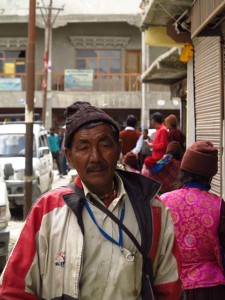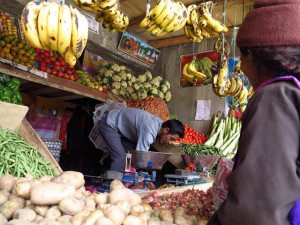Three years ago, in September 2012, two dozen Ladakhi Buddhists decided to convert to Islam, and the social relations in the area, which had been harmonious for centuries, took a severe nosedive. The conversions, and the subsequent strife, took place in Padum, the administrative center of Zanskar, which is a remote mountainous region of the Kargil District in Ladakh.

Despite the fact that a prominent book published in 2015, Fire and Ice by Jonathan Mingle, characterized the people of Zanskar, and the Padum area in particular, as highly peaceful—more so, perhaps, than the rest of Ladakh—news reports over the past few weeks about the consequences of those conversions three years ago cast doubt on the ability of that community to retain its traditional harmony.
Last week, a news service in India explained that the Buddhist community in Zanskar was inflamed three years ago by the news that two dozen people were about to convert to Islam. The Zanskar Buddhist Association (ZBA) alleged that the conversions were being forced on 24 Buddhists, which the ZBA hotly denounced. The Muslims supposedly accepted the converts eagerly—even going so far, so the story goes, of welcoming them with a sort of victory parade. Zanskar has nearly 14,000 inhabitants, 95 percent of whom are Buddhists and 5 percent Sunnni Muslims, according to the report.
Sikander Khan, a 66-year old Muslim in Padum, said that the next month, October 2012, local officials in the town called a meeting with the Muslims to discuss the security of the converts. He wanted to find ways of accommodating the Buddhist demands. While they were involved in the meeting, however, Buddhists gathered and marched on the Muslim neighborhood, attacking and ransacking homes. Officials in the meeting kept the Muslims inside until the situation was under control. Fifteen Muslims were injured in the attack, two of them seriously enough that they had to be taken by air to Srinagar for medical treatment.
The ZBA quickly imposed a forceful social boycott on the Muslin minority, making their lives quite difficult. The boycott continues to this day. Sikander explained that the ZBA has prohibited all economic and social relations between the two communities.
The Muslims find that the vast majority of stores, owned by Buddhists, will not sell anything to them. Likewise, Buddhists are not permitted to patronize Muslim shops. If a Buddhist is caught in a Muslin store, he has to pay a large fine.

Muslims in Padum complain that they are not getting help from local officials and politicians. Tsering Angdus, Executive Councillor, spoke sympathetically for the Buddhist position in the continuing dispute. “Back in 2012 when Buddhists embraced Islam then the Muslims from Padum took out [a] procession in the town holding the converts on [their] shoulders like they had won a World Cup.”
He went on to say that he is doing his best to end the boycott and to restore normal relations. But, he argued, it will take time for the social wounds to heal. He felt it would be best if some of the non-governmental organizations would get involved and try to help end the boycott.
Another official, Panchok Tashi, who is a nominated councilor, denied that there is a social boycott in Padum, but he added that private merchants can’t be forced to sell to people with whom they do not wish to have relations.
In August 2015, Muslim business people and taxi drivers in Padum arranged for a meeting with the leaders of the Ladakh Autonomous Hill Development Council, Kargil. The meeting included both Panchok Tashi and Tsering Angdus. They heard the grievances of the Muslims and promised to intervene. But months later, nothing has changed. The Muslims are running out of options.
Nazar Mohammad, a 54-year old Muslim farmer, complained bitterly about the situation. He said that the boycott has made their lives very difficult. They cannot build anything because the Buddhists control the areas along the Tsarap River next to town, a tributary of the Zanskar River, where builders need to take sand and stones for construction purposes. The barter system among neighboring farmers has been the basis of local life, “but the social boycott has brought doom to it,” he said.
Sajjad Hussain, a freelance journalist based in Kargil, has been closely following the boycott. “Our Buddhist brothers have always been peace-loving persons and have remained harmoniously with Muslims [for] centuries,” he said. He blamed a right-wing Hindu nationalist group that has widespread influence throughout India, the Rashtriya Swayamsevak Sangh (usually referred to as the RSS), as being the primary instigator of the troubles.
A different news story published on December 2 reported that the Muslims in Zanskar are even getting very hungry. “We are on the verge of starvation. We seek intervention of Mufti Muhammad Sayeed [the Chief Minister of the state of Jammu and Kashmir] to save our lives. The majority community (Buddhists) has snapped all links with us,” a group of Muslims told the news service.
News reports in January 2015 indicated that the Ladakh Buddhist Association protested what it claimed at that time were incidents of Muslim men in Zanskar luring Buddhist women into marriages. These actions occurred in late 2014 and early 2015, according to a letter quoted in the press that the LBA had sent to Indian Prime Minister Modi.
While the reporting of these events in various press accounts may not be completely impartial, they do give the reader a sense of the tensions that exist between the Buddhists and the Muslims of the Zanskar region in Ladakh.